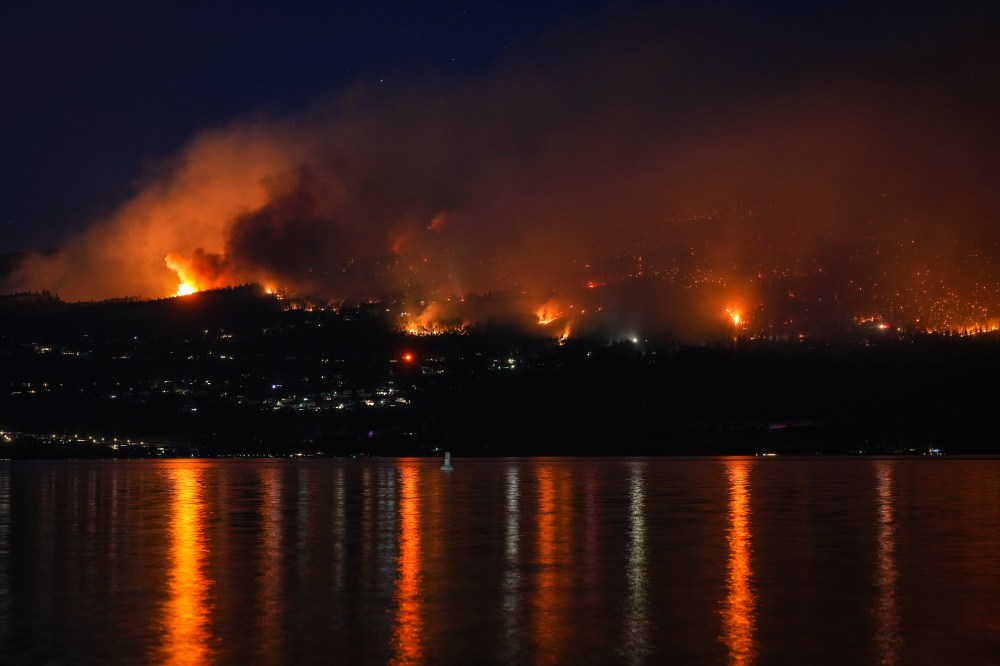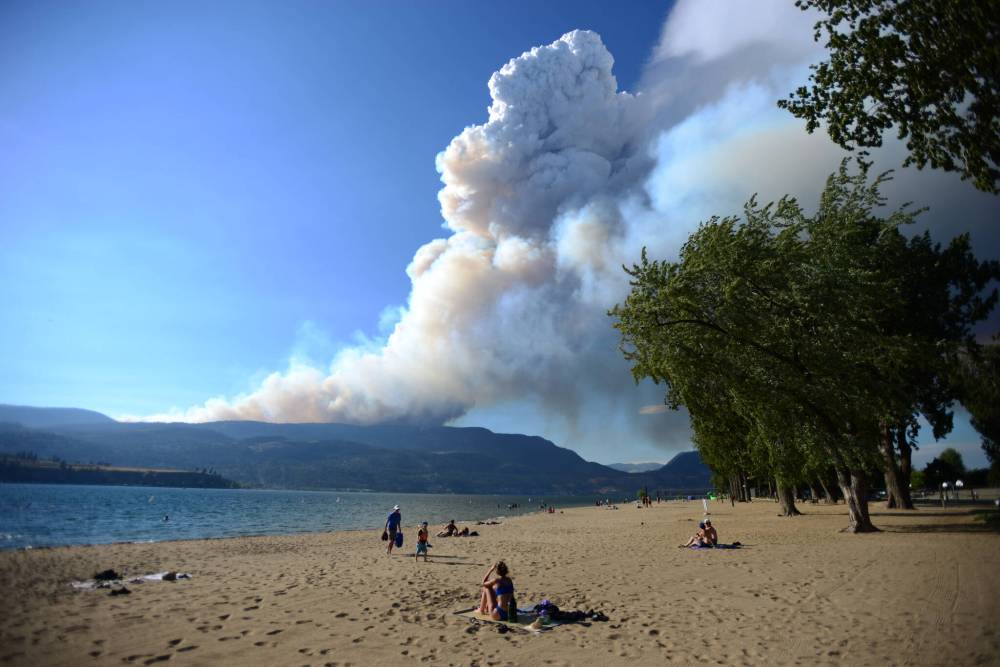Look outside; Canada’s future is on fire
Read this article for free:
or
Already have an account? Log in here »
To continue reading, please subscribe:
Monthly Digital Subscription
$0 for the first 4 weeks*
- Enjoy unlimited reading on winnipegfreepress.com
- Read the E-Edition, our digital replica newspaper
- Access News Break, our award-winning app
- Play interactive puzzles
*No charge for 4 weeks then price increases to the regular rate of $19.00 plus GST every four weeks. Offer available to new and qualified returning subscribers only. Cancel any time.
Monthly Digital Subscription
$4.75/week*
- Enjoy unlimited reading on winnipegfreepress.com
- Read the E-Edition, our digital replica newspaper
- Access News Break, our award-winning app
- Play interactive puzzles
*Billed as $19 plus GST every four weeks. Cancel any time.
To continue reading, please subscribe:
Add Free Press access to your Brandon Sun subscription for only an additional
$1 for the first 4 weeks*
*Your next subscription payment will increase by $1.00 and you will be charged $16.99 plus GST for four weeks. After four weeks, your payment will increase to $23.99 plus GST every four weeks.
Read unlimited articles for free today:
or
Already have an account? Log in here »
Hey there, time traveller!
This article was published 18/08/2023 (833 days ago), so information in it may no longer be current.
NEW DENVER, B.C. — I’ve stopped at a gas station in this small town where I’m staying, in the BC interior mountains, when the cashier gives some advice.
“Be prepared for evacuation tonight if dry lightning touches down,” she says. “The RCMP told us to be on alert if a forest fire pops up.”
She shows me how to download an app that will inform me an evacuation notice is issued. I do it immediately.
New Denver, like all towns on roads through the mountains of BC, is surrounded by old forests and undergrowth, now bone-dry and a single spark away from turning into a blaze.
“We have go-bins packed in case we have to leave quickly,” Yasmin Rodriguez tells me. She and her husband Zeb McClure own the cabin where I’m staying.
I ask them what go-bins are.
“They are bins with enough food, water, medicine, clothes and pet supplies to last two weeks,” McClure explains.
The couple should know how to prepare for emergencies; they lived through Hurricane Maria in Puerto Rico in 2017.
“We know how to handle things if a fire comes here,” Rodriguez says. “We’re ready.”
If a fire starts and gets out of control, I’m told we will have only a few hours to leave on the single highway that leads north and south out of town.
That is, if another fire hasn’t popped up and shut down the escape route.
DARRYL DYCK / THE CANADIAN PRESS The McDougall Creek wildfire burns on the mountainside above lakefront homes in West Kelowna, B.C., on Friday.
New Denver is the third community I’ve visited this summer where everything is coated in a layer of ash every morning. In fact, ash is falling on my laptop as I write this column.
In May, I was in The Pas when the fires at Pimicikamak Cree Nation forced the evacuation of 7,000 residents. There was ash everywhere then, too.
Last month I was in Whitehorse in the Yukon when a 1,400-hectare wildfire just west of the city burned out of control. I stayed in a hotel full of families who’d fled to safety.
This is not to mention the numerous Canadian cities I’ve been to immersed in smoke. I don’t have to convince you, I’m sure.
Now, I am travelling through rural British Columbia, where a record-breaking 366 active wildfires — more than a third of the 1,040 fires currently burning in Canada — are raging.
This week the City of Kelowna — 145 kilometres from where I sit now — declared a state of emergency due to nearby fires and evacuated 763 properties. By Friday, homes were burning.
Kamloops has been under threat for weeks as fires to the south threaten the city.
Just hours ago, government officials declared a state of emergency in Fraser Canyon and closed Highway 1 through the area.
JOE O’CONNAL / THE CANADIAN PRESS Smoke from the McDougall Creek fire is seen over Okanagan Lake from Kelowna, B.C., on Thursday.
Back here in New Denver, usually known for its picturesque views, the mountains and water can be barely seen through the smoke. All that’s visible is a perfect red circle, the sun, through the haze. Breathing is difficult, coughing is normal and the smell burns the nose.
Helicopters carrying water to douse forests are a regular sight.
News of the wildfires rampaging through B.C.’s Rocky Mountains has been drowned out due to the devastation in Maui and, now, the evacuation of Yellowknife in the Northwest Territories.
B.C. isn’t even the leader in wildfires in Canada this year — Québec holds that dubious title.
Whether one accepts that climate change is the cause of this year’s fires, the world’s climate is being irrevocably impacted now.
Whether one accepts that climate change is the cause of this year’s fires, the world’s climate is being irrevocably impacted now. Forest fires in 2023 in this country have released nearly 300 million tonnes of carbon into the world’s atmosphere — a quarter of the global total.
The damage and cost have yet to be calculated. More than 130,000 kilometres of territory — the size of Greece — has burned. In 2017, the wildfires in northern Alberta destroyed 5,000 kilometres and cost taxpayers and insurance companies $9 billion. You do the math.
Fires are burning up this country’s future.
This week, 16 youths in Montana won a landmark case against their state government when Judge Kathy Seeley concluded that “emissions from Montana’s fossil fuel consumption, extraction and infrastructure are globally significant quantities.”
According to Seeley, the state therefore is violating it’s constitution to “maintain and improve a clean and healthful environment in Montana for present and future generations.”
Due to its vast coal, oil and gas resources, Montana emits the sixth-highest volume of greenhouse-gas emissions per capita in the United States. Greenhouse-gas emissions are primarily carbon.
In the case, Montana was found guilty of burning up its future, too.
Unsurprisingly, the state is appealing the decision but this has opened the door for other youths — including those in Manitoba — to hold governments and politicians accountable for their failure to secure a healthy environment for this country’s future.
Something, anything and everything must be done to stop the fires.
Now, and for the future.
niigaan.sinclair@freepress.mb.ca

Niigaan Sinclair is Anishinaabe and is a columnist at the Winnipeg Free Press.
Our newsroom depends on a growing audience of readers to power our journalism. If you are not a paid reader, please consider becoming a subscriber.
Our newsroom depends on its audience of readers to power our journalism. Thank you for your support.






